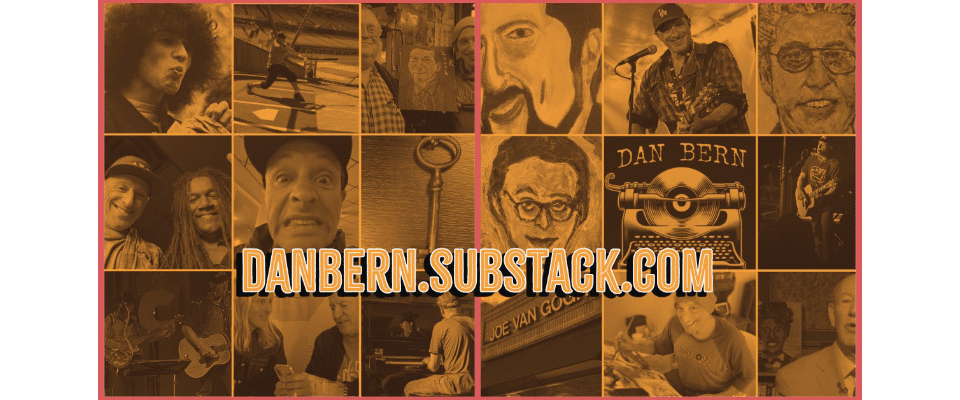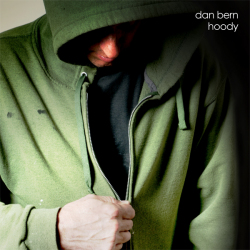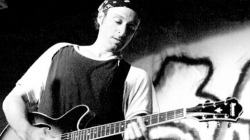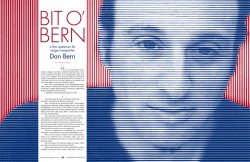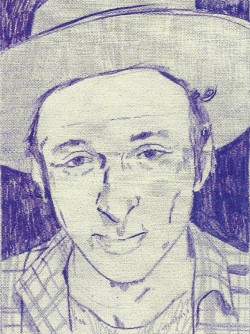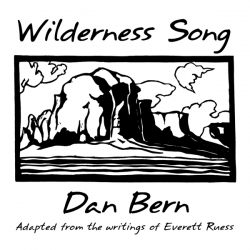Dan Bern – Transitions
By James Campion
New Record Hoody and Tour Marks Uncharted Territory for Singer-Songwriter
It was winter and it was late and Dan Bern was on the phone, calling from somewhere south of El Paso, Texas in his van heading to another gig. This one would be about 400 miles away. He had a few boxes of his new CD, Hoody bounding around in the back and a new Bluetooth unit installed in the old girl, and I am sure there was some coffee involved. He was in the mood to talk.
These late-night chats are nothing new for us. Sometimes they come earlier. Sometimes we’re actually in the same vicinity, the same city, and even amazingly in the same room, but it’s the late-night ones from the road where he gets contemplative and digs deep into his songwriting and his plans and shares tales from these never-ending tours, blessedly separated by occasional spurts at home with the family.
We talked about the new record and his upcoming shows this spring – one of which will take place in NYC on April 23 at the Highline Ballroom.
Here’s part of it…
jc: Hoody features a mature, established style of writing. The vocals are really polished and it seems like a new step for you. I know that you don’t necessarily write for a record, you pick the songs you like the best. But was there a specific idea of what kind of songs you felt worked best with this collection?
Dan Bern: Well they were just kind of the new batch and because of that it felt pretty much of a piece. The previous one took such a long time, Drifter, and I felt when I made it or when I released it, it almost felt, and this has happened before, like I’m already kind of past it. It’s the byproduct of time, like the stars where you see the light later, you know? By the time it’s out I’m already on to something else. With this one, because we were all able to get in there and basically play at the same time, it still took a long time to finish it, with people going away and people disbursing, trying to get this guy or that guy to complete something, but it was the current crop and it felt like there was some excitement with these songs and with this group of people playing it.
jc: Did you record it live? .
DB: Yes, there’s this little studio here where we all live in Echo Park called Pehrspace. It’s nothing special at all. They do punk shows there after hours; a very cement kind of building, sort of industrial, which I like. I’ve always liked places like that. It was big enough that we could all set up and play at the same time, so I think every vocal of mine was cut live with the band. I may have tried a couple again, but I was like, “I am not going too better ones than those.” I was singing while we were all playing, just kind of locked in.
jc: Have you ever done it like that before?
DB: Yeah, I’ve probably done that before. I remember when I was doing the Breathe record, it was the same thing. I was very confident that there was no way that I was going to beat those vocals that I had sung when the thing was being played and I never really could. Anyway, on this one it all pretty much tumbled out. I think Greg Prestopino did a great job, taking what we did and mixing it, putting a touch here and there. I have known Greg forever but we never really worked together and it was a very interesting collaboration. I think we got it as good we were going to get it.
jc: Who are the musicians on Hoody?
DB: The core of it was Common Rotation, but it’s changed a lot since we did Drifter, for one thing Adam Busch was always like the utility man. He played a little of this, a little that kind of thing. For a lot of this stuff he moved over to the drums, which he had never done with us. I’ve been doing these shows with just me and him and that seemed to work with these songs. Jon Flaugher is a phenomenal bass player. We had two other drummers that were there on different days, Tripp Beam and George Sluppick, who are both top notch drummers.
jc: Do I hear lap steel and that kind of stuff going on in this record? I also hear banjo and I assumed that was Jordan Katz.
Dan: Yeah, and that’s Eric Kufs that you hear on steel guitar. The real great electric guitar playing is Eben Grace, who has been playing with me since way back in the IJBC days. He’s always been my favorite guitar player.
jc: Let’s get back to the actual structure and the writing of the record. When you completed Drifter you said that you felt as though you were putting a lid on the early Dan Bern character, so would you say that this is the first record where, if there’s such a thing as the Dan Bern character from the first eight, nine albums, he’s absent? And if so, did you approach the writing to put that part of your career to bed?
DB: It kind of feels like a further progression from where we were at Drifter, the logical next step. We’re better as a band. I am trying to become better as a performer and more aware of the audience and connecting better. I mean, just musically my thing has always been tied to old folk and blues, tied to country and British invasion rock n’ roll. Those are my things. I always had a foot in some of that, but after this record it feels like it’s really pretty synthesized, it’s all kind of come together.
jc: Can you expound on your feelings about your professional and personal transitions that you have gone through and how they’ve informed your work over the years? For instance, can you specifically listen to a record like New American Language or the first record or Drifter and say, “I know where my head space was at then” and how each have been signposts for your career?
DB: For sure, it’s going to be different for somebody else than how it is for me. It’s my diary, really. For anybody else it’s what they make of it. For me, yeah, they’re little sign posts. It’s funny, I’ve been playing these songs for some time now and now that the record’s out it’s already shifted for me a little bit. This stuff is now not the stuff I’m working on to try to complete, it’s like for better or worse, whatever anybody might think about it, it sort of has a string around it right now. Now I’m trying to synthesize some of these songs into a bigger batch of songs that can rub against other things.
jc: The songs on Hoody are almost all less than three minutes. There are no sweeping ten-verse epics on here, or anything deeply political. A lot of the songs are so meticulously structured you can almost say they are pop-style songs. Was that something that you specifically paid attention to, were you like, “Okay, I am going to try to write songs in quick two verses and get to the point?”
DB: It wasn’t intentional, but it was intentional in a way when I wrote them, I suppose. I was working a lot with a bunch of people and we were always trying to trim the fat – you don’t need a second verse, jump straight to the bridge – that kind of thing; just stream line. So that probably also spilled into the stuff I was writing.
jc: What is the main difference between singular and collaborative songwriting for you?
Well, it’s like the difference between doubles and singles in tennis; it sort of opens things up. There’s times when I’m paired with a real melodic guy…or girl, and they know chords I’ve never even heard. In that case, I might be the lyrics guy. And other times there’s somebody who’s a wordsmith and I become the music guy. And then sometimes you’re working line by line together, going chord for chord. It’s really fluid and different every time. You learn to be patient, wait for someone to come up with something that would be better than what I could have thought of. You’re using different muscles than you would by writing by yourself. It’s difficult to write by yourself all the time; nobody to run things by; but if there’s more than one other person involved, things could get derailed sometimes too.
jc: Does almost anything inspire you to write a song?
DB: Last night I played this brand new theater in Cortez and I was supposed to go on at eight and it was seven-thirty and it suddenly dawned on me this is a nice occasion to have a new song and I should write one about the experience. So, instead of lamenting that I should have had a song prepared, I thought, well I have some time, so I wrote a song about it. I opened the set with it and it killed, it just set the tone. Then I recorded it for the local radio station. It’s nice when it works like that.
jc: Okay, so take me through the process; you’re sitting there you have a half hour to go before you’re going to do a show and then you decide you want to write this song. Do you start with a title or do you write about the theater, do you write about the experience, where do you go?
DB: It’s all those things. They’re sort of bouncing around. The theater was called the Sunflower and I was the first one to play there and I just made a little joke, a reference to the sunflower being like a girl. And I started singing this thing, “I’m not yours, there will be others, that’s true, but sunflower, I was your first, that’s true too.” So I was like, “Okay, I like that, let’s start with that.” I wrote a quick verse about just what the sky looked like coming into town, which worked with me being her first. Basically I’m popping her cherry. (laughs) But, it’s all sweet, you know?
jc: I really dug how you just whipped off a verse or two about my novel when I saw you at Mexicali Blues a few months back. I know you’re always reading something or commenting on pop culture, making references to TV and news and sports figures. In that case, are you always formulating songs?
DB: I guess I am; it could be a lot of different things, like you can reference the book or the work or you can reference a character or a place or a thing that’s in the book that sparks something. You can use a character for a model in your own verse. You can take one word and trip off that word and like twenty minutes later you have this whole other thing and then go back to the book again. I suppose people write haiku, short little poems or any sort of musical, literary forms, and you can make a quick sketch too, and you can also really work on a song or a piece of music, but at the same time this stuff is really mercurial. It’s like catching lightening in a bottle; the electrical impulses in our brain, you know? There’s electricity, they move at the speed of light, they move really fast and you can’t always know where these things come from. It’s like when you meet a lot of people in a short amount of time and you’re moving around too and then you’re trying to remember who said something. Maybe you’re at a convention or something and you just met a hundred people and then you try and remember a conversation you had, who it was with and what was said or what the context was. Who knows? But at that point, you’re going to use it for something.
jc: So it ends up in your subconscious and you rummage through that when writing a song?
DB: Yeah, yeah, and you have the most control, more than anybody else, about what your feeding yourself; what your reading, what you’re watching, who you’re hanging out with, how much you stare at your phone versus looking at a tree.
jc: And of course over the past few years since having your daughter, Lulu, you have written and released a ton of children’s songs and you recently wrote the theme song for an animated series, Stinky & Dirty. So I assume having something that profound happen to you has influenced your writing greatly.
DB: It’s true. Recently I’ve begun to realize how insufficient this road thing, driving five, six hundred miles a day to a gig. And I feel like I have all these things – the baseball record and the Everett Ruess album, the kid’s stuff, Theme Park (monthly online show on stageit.com in which Bern plays themed song cycles) and my song workshops – so to drive all this way to play “Black Tornado”, “Hoody” and “Marilyn Monroe” and that’s it I feel like I’m leaving a lot on the table. So I was thinking maybe I could work something out with a local promoter or a theater and come and stay in a town for a long weekend and bring some band mates and Fridays stop at the school and play for the kids and Friday nights for the first half do the Everett Ruess show, then intermission, then do the baseball songs. Then on Saturday do another kid’s show and that evening do the big blowout, rock and roll show. On Sundays I could do a live Theme Park at a small venue and then a workshop. I can hit people on a lot of different levels.
jc: Like “Weekends with Bernstein”!
DB: Yeah, you know, you could bring the kids like a carnival or a circus stop. I kind of feel like I’m short-changing my audience by being one-dimensional when I have all these other things to offer, you know? Anyway, I’ve been doing a lot of driving around and that’s what I’ve been thinking about.

